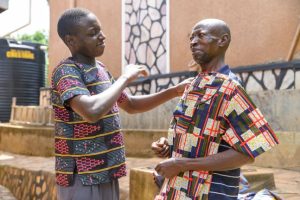Blog
The Power of Communication: How sign language connected a father to his deaf son
October 26, 2023
Deaf Child Worldwide (DCW) is the international arm of the National Deaf Children’s Society,the UK’s leading international charity for deaf children in developing countries. DCW works with partners in low- and middle-income countries (LMICs), enabling deaf children and young people to be fully included in their family, education and community life.
Here, Joanna Clark, Director of Deaf Child Worldwide, shares a story she recently learned. It demonstrates very clearly and shows how communication has the power to replace despair with that most valuable of commodities: hope.
Deaf children are born with the same ability to develop language as any other child. They use language to bond with their family, make friends and make sense of their world. Whatever the circumstance, the way a parent communicates with their deaf child can make a life-changing difference to both of them.
This is the story of Joseph and Oyo
Joseph is a single father. A builder by trade, he lives with his deaf son Oyo, 19, and hearing daughter in the Mukono region of Uganda.When he first learned of Oyo’s deafness, Joseph was heartbroken. “I felt lonely,” Joseph told us, “there was no way of understanding him and he couldn’t understand me.” Joseph’s relationship with Oyo was fractured,

not just by the lack of a language with which to communicate in any meaningful way, but also by the cultural expectation that it is the mothers who take care of the child-rearing, while the fathers, traditionally the breadwinners, take a back seat.
Joseph refused to accept their plight
This is where Joseph and Oyo’s story becomes both rare and remarkable. Joseph refused to accept their plight. A friend had mentioned a place in the region run by an organisation called the National Association of Parents of Deaf Children (NAPADEC), Deaf Child Worldwide’s partner organisation in Uganda. This is how, in 2021, Joseph became one of only two fathers attending NAPADEC’s Mukono Parent Support Group (PSG).
In the PSG, Joseph immediately found a space in which he could connect with other parents coping with the same struggles. He gained strength from their company. “When I go and we meet, we can discuss and the stress is released from you,” said Joseph. “I always feel happy when we meet together and wish we could be meeting like three or four times a week.”
Most significantly, the PSG offered Joseph the means to communicate with his son via Ugandan Sign Language (USL). Joseph jumped at the chance to learn and would take home what he’d learnt at the PSG and teach it to Oyo. Oyo, for his part, had learnt some USL at residential deaf school, but because at that time no-one in his family knew any USL, all he could do was point at things. So it was a long and laborious process at first, since the two of them had to build up a common vocabulary of signs before they could have a proper conversation.
The lifeline of language
But the effort they put in started to pay dividends as their communication improved. “As time went on, we started getting to know each other a lot,” Joseph told us. “It’s really pleased me to change my life, our lives, both of us actually. And I’m really very happy. I always enjoy being with him instead of other people.’’ Oyo enjoyed telling his dad about his school friends and they would laugh together at the stories.
Joseph’s life-changing journey has transformed him into a powerful advocate for the vital importance of good communication between deaf child and parent. The power of hope really shines through in his advice to other parents of deaf children: “They shouldn’t just sit there, thinking this is going to be a waste of time, it’s useless, we can’t do anything. Because there is a way through for these children. There’s hope for them. For the parents and the children. There is hope for them, a future for them.”
Joseph’s experience as a single parent has also given him an understanding of the crucial role that fathers need to play in their own children’s upbringing, one he’s keen impress upon other fathers whenever he gets the opportunity.
A brighter future
Joseph is now hopeful of a brighter future for his son. “Well, I want him to study, I want him to know things,” he told us, “-because there are things you may not know if you don’t go to school.” For his own part, Oyo wants to be a either a mechanic or work in a design-related field. In an ideal world all deaf children would be identified promptly and their language development would begin in their early years. But what Joseph and Oyo’s story proves is that it’s never too late to begin this process, no matter what the obstacles.
Of course, sign language is just one of a number of methods used by deaf people to communicate, but in this case, it enabled Joseph and Oyo to enjoy the kind of relationship that just a few months previously had seemed inconceivable.
Photo credit: Joseph and Oyo/Deafchild Worldwide

